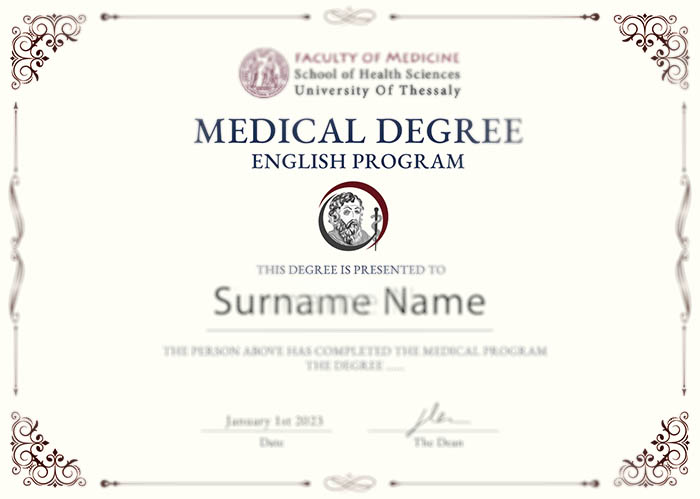Our program is dedicated to educating medical students and providing health professionals with the highest scientific standards. We are committed to prioritizing high-quality research in collaboration with Greek and international research centers. In our program, students have exclusive access to diverse research programs and invaluable hands-on experience in cutting-edge laboratories and medical departments/clinics, both in patients and outpatients. Our unwavering commitment to imparting ethical values that govern medical practice guarantees that our students and young medical doctors acquire the scientific knowledge necessary to confidently diagnose and manage health problems effectively
Educational objectives
Upon completion of the Medical Degree English Program, graduates are expected to have acquired the following
i. Thorough knowledge of basic sciences
ii. Proficiency in fundamental clinical skills of Medicine
iii. Strong critical thinking abilities and the capacity to integrate their knowledge to prevent, diagnose, and treat common diseases and illnesses within the population
iv. Effective communication skills with patients, their families, and healthcare staff in order to optimally address patient issues and promote public health
v. Ethical conduct, a strong sense of responsibility, professionalism, and dedication to the patients they will serve.
The objective is to nurture in our students a passion for research, a desire to teach their peers, the capacity for self-reflection and self-critique, and a commitment to furthering their education and enhancing their skills for their future roles.
12
SEMESTERS
64
OBLIGATORY COURSES
8 out of 66
ELECTIVE COURSES
Credits - ECTS
Overview of the Medical Degree English Program
Credits - ECTS
Undergraduate and postgraduate programs of higher education institutions are organized on the basis of the European Credit Transfer and Accumulation System - ECTS, which is a system for describing the curricula of higher education institutions.
Credits express the workload required to complete the goals of an academic program by each student. The workload includes the time required to complete all the planned learning activities, within an academic curriculum, such as attending lectures, seminars, independent study, homework preparation, internships, exams, preparation of the dissertation.
The workload for each full-time student during an academic year is estimated at sixty (60) credits and thirty (30) credits per semester.
To obtain the Degree of Medicine a student of Medical Degree English Program must successfully complete 360 ECTS.

Curriculum structure
The curriculum of the Medical Degree English Program contains the titles of the compulsory/obligatory core and elective courses, their content, the semester hours of teaching work, the number of teaching units corresponding to them and the time sequence of the courses. For all the courses of the curriculum, the faculty member that has the responsibility of teaching them is determined. The syllabus describes the content of each course and details of how it is taught.
Each academic year is divided into teaching periods called semesters, the winter and spring semesters. The courses of the study program are divided into twelve independent semesters of study. During the winter semester of each academic year, the courses are taught which fall into the 1st , 3rd , 5th , 7th , 9th and 11th semesters . During the spring semester the courses are taught in the semesters 2nd , 4th , 6th , 8th, 10th and 12th .
The courses of the of the Medical Degree English Program can be functionally divided into three parts, although the curriculum encourages the cross-sectoral and vertical interaction of all subjects:
In the preclinical part: (indicative from the 1st to the 5th semester of Studies), during which courses of Basic Sciences, Morphology of the human body, Social Medical Sciences, Laboratory Medicine and other courses that prepare the student for the clinical part of the program are taught.
In the clinical part: (indicatively from the 6th to the 10th semester of Studies), during which the diseases of the human body are taught (etiology, pathogenesis, natural history, diagnosis and treatment), as well as the methods of their prevention. The training takes place to a significant extent in clinics and clinical laboratories.
In the Clinical Training (practice) of the last two semesters of Studies.
Analytical description of curriculum
Compulsory Courses per semester
C: COMPULSORY COOURSE / E: ELECTIVE COURSE
Clinical Training in the 6th year

Medical Degree
(Ptychion Iatrikes)
Upon successful completion, the students receive the Medical Degree (Ptychion Iatrikes), which is in accordance with the EU Directive 2005/36/E and gives them access to postgraduate studies (Masters), Doctorate in Medical Science (Doctorate
Diplomas) and a licence to practice the medical profession in the Public and Private Sector within European Union.

